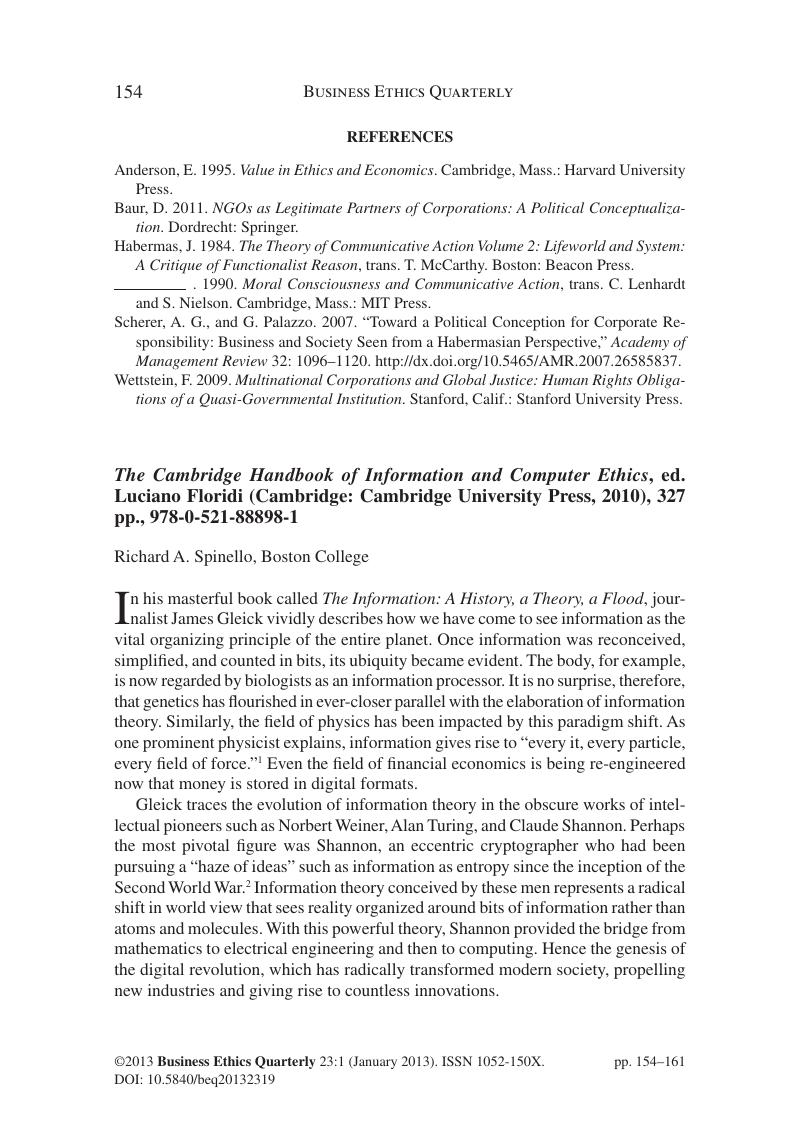No CrossRef data available.
Article contents
The Cambridge Handbook of Information and Computer Ethics, ed. Luciano Floridi (Cambridge: Cambridge University Press, 2010), 327 pp., 978-0-521-88898-1
Published online by Cambridge University Press: 23 January 2015
Abstract

- Type
- Book Reviews
- Information
- Copyright
- Copyright © Society for Business Ethics 2013
References
(1) Gleick, James The Information: A History, a Theory, a Flood. (New York: Pantheon,2011). 10.Google Scholar
(2) Ibid., 219.Google Scholar
(5) Ibid., 289Google Scholar
(6) Floridi, Luciano and Sanders, J.W.“On the Morality of Artificial Agents, ” Minds and Machines 14(3) (2004): 349–79.CrossRefGoogle Scholar
(7) Wendell, Wallach “From Robots to Techno Sapiens: Ethics, Law and Public Policy in the Development of Robotics and Neurotechnologies, ” Law, Innovation and Technology 3(2) (2011): 185–207.Google Scholar
(8) Sullins, John “When is a Robot a Moral Agent?, ” International Review of Information Ethics 6(1) (2006): 23–30.Google Scholar
(9) SeePlato’sGorgias in The Dialogues of Platovol.1trans. Allen, R.E. New Haven, Conn.: Yale University Press (1984): “[I]f a man does something for a purpose, he does not wish the thing he does, but that for the sake of which he does it”(467c).Google Scholar
(10) Not all human behavior qualifies as action or actus personae. Karol Wojtyla distinguishes between personal action or «I act,« which involves a self-conscious subject causing an action with determinate effects, and «something happens in me« (such as feelings or other psychosomatic phenomena), which occurs regardless of the self's intentions. See The Acting Person, trans Potocki, A. Dordrecht: D. Reidel (1979), 60– 66.Google ScholarSee also Finnis, John“The Act of the Person”, in Persona Veritá e Moraleatti del Congresso Internazionale di Teologia MoraleRome: Città Nuova Editrice(1986), 159– 75.Google Scholar
(11) Dickerson, Matthew The Mind and the Machine Grand Rapids, Mich.: Brazos Press (2011): 98–106.Google Scholar
(12) Searle, John The Rediscovery of Mind Cambridge, Mass.: MIT Press,(1992): 20–43.Google Scholar


